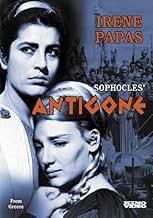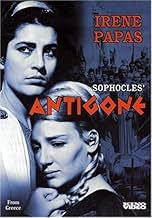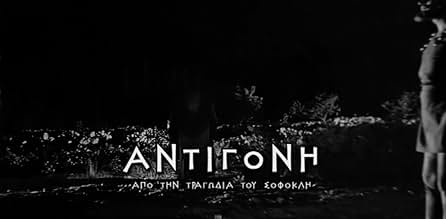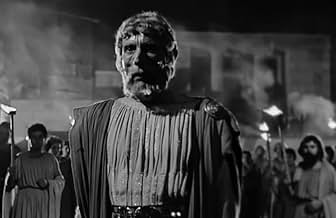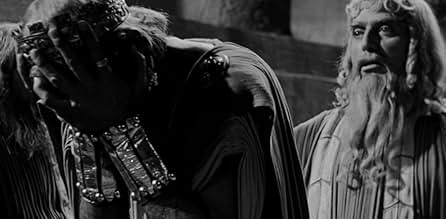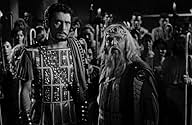Füge eine Handlung in deiner Sprache hinzuAntigone defies her uncle's decree that her traitorous brother should go unburied and therefore find no rest in the afterlife; however, her actions have tragic consequences.Antigone defies her uncle's decree that her traitorous brother should go unburied and therefore find no rest in the afterlife; however, her actions have tragic consequences.Antigone defies her uncle's decree that her traitorous brother should go unburied and therefore find no rest in the afterlife; however, her actions have tragic consequences.
- Regie
- Drehbuch
- Hauptbesetzung
- Auszeichnungen
- 3 Gewinne & 1 Nominierung insgesamt
Yorgos Karetas
- Elder of Thebes
- (as Giorgos Karetas)
Mimis Rougeris
- Elder of Thebes
- (as Dimitris Rougeris)
Empfohlene Bewertungen
Moral claims do not give rise to philosophical grounds. Yet, In Antigone it is clear that moral actions prompt philosophical questions, and inherently make good drama.
This review acts as a strict focus on how moral and ethical points are made throughout the film, and how they act as catalysts to progress the story and keep the viewer involved. Be it known that I have not read the Sopheclean text of Antigone, and fully derive all of my comments and criticisms solely within the boundaries of the film.
The character flaws present in the film mostly derive from wayward and distorted adherences to moral ideologies. For example, Antigone's ethical and moral backbone throughout the film is guided by powerful intangibles like love and loneliness, which makes her rash and at times misguided. Creon's moral code is also in knots as he acts as a Euthyphro in the fact that he is conflicted and contradictory to many of his beliefs that shape him, i.e. his aforementioned moral code.
Values undoubtedly shaped the society of Ancient Greece. Loyalty was a cornerstone value in this society, yet loyalty drifts and fades as tides turn in Antigone. For example, as Creon is crowned King of Thebes he is shown immediate support as the new benevolent King, yet mourning for Oedipus, or any mention of him whatsoever is non existent. Is this a loyal Thebes? Though support of Creon was warranted by his grace, the remembrances of a fallen king laid flat.
As Creon sits on his thrown surrounded by his court he states, "The country's foe is always mine." Little did Creon know that he was the biggest threat to his country, and thus his own foe. Because of the nature of Greek Tragedies and the intuition of most people, the common viewer could understand this at first glimpse. It was clear that Creon's hubris and pride would be his downfall.
Antigone, acting as the protagonist in the film, is the embodiment of good. Yet, contradictions within her moral ideology leads to questioning what "good" actually is. Is her entire moral and ethical embodiment good? Is it her choices of which moral standpoints to act upon that are what is good? Or is it her actions that are good? Simply put, Antigone is a walking paradox. It is impossible to know what is good. Acting against Zeus due to her undying love and care for her brother, or burying her brother because it is just in the Gods' eyes to do so. Both are contradictory and both can be good.
It is clear that both the protagonist and antagonist have inner conflicts. Their inner ideologies contradict. What makes one a "protagonist" and another an "antagonist" lies in the fact that the shared ideologies between them also conflict. Inner contradictions within an individual which conflict with another individuals already clashing ideologies makes it impossible to know who is right and who is wrong. Both characters were acting upon the same ethical grounds. They acted to safeguard human law, religious law, and family values. Is it then that moral grounds are shaped by convenience and circumstance? Does one's moral backbone fit the skeleton of a different distortion of themselves? Is moral rectitude a variable of space and time? Is it the contradictions of moral standpoints that are convenient because they can be malleable to fit any form? These are the questions that I believe the film poses.
The film does a fantastic job at examining exactly what grants a legitimate moral claim or action, which most people are curious about. Reason is man's most precious gift, and by the will of nature, the tone of his reasoning is determined by his moral code.
This review acts as a strict focus on how moral and ethical points are made throughout the film, and how they act as catalysts to progress the story and keep the viewer involved. Be it known that I have not read the Sopheclean text of Antigone, and fully derive all of my comments and criticisms solely within the boundaries of the film.
The character flaws present in the film mostly derive from wayward and distorted adherences to moral ideologies. For example, Antigone's ethical and moral backbone throughout the film is guided by powerful intangibles like love and loneliness, which makes her rash and at times misguided. Creon's moral code is also in knots as he acts as a Euthyphro in the fact that he is conflicted and contradictory to many of his beliefs that shape him, i.e. his aforementioned moral code.
Values undoubtedly shaped the society of Ancient Greece. Loyalty was a cornerstone value in this society, yet loyalty drifts and fades as tides turn in Antigone. For example, as Creon is crowned King of Thebes he is shown immediate support as the new benevolent King, yet mourning for Oedipus, or any mention of him whatsoever is non existent. Is this a loyal Thebes? Though support of Creon was warranted by his grace, the remembrances of a fallen king laid flat.
As Creon sits on his thrown surrounded by his court he states, "The country's foe is always mine." Little did Creon know that he was the biggest threat to his country, and thus his own foe. Because of the nature of Greek Tragedies and the intuition of most people, the common viewer could understand this at first glimpse. It was clear that Creon's hubris and pride would be his downfall.
Antigone, acting as the protagonist in the film, is the embodiment of good. Yet, contradictions within her moral ideology leads to questioning what "good" actually is. Is her entire moral and ethical embodiment good? Is it her choices of which moral standpoints to act upon that are what is good? Or is it her actions that are good? Simply put, Antigone is a walking paradox. It is impossible to know what is good. Acting against Zeus due to her undying love and care for her brother, or burying her brother because it is just in the Gods' eyes to do so. Both are contradictory and both can be good.
It is clear that both the protagonist and antagonist have inner conflicts. Their inner ideologies contradict. What makes one a "protagonist" and another an "antagonist" lies in the fact that the shared ideologies between them also conflict. Inner contradictions within an individual which conflict with another individuals already clashing ideologies makes it impossible to know who is right and who is wrong. Both characters were acting upon the same ethical grounds. They acted to safeguard human law, religious law, and family values. Is it then that moral grounds are shaped by convenience and circumstance? Does one's moral backbone fit the skeleton of a different distortion of themselves? Is moral rectitude a variable of space and time? Is it the contradictions of moral standpoints that are convenient because they can be malleable to fit any form? These are the questions that I believe the film poses.
The film does a fantastic job at examining exactly what grants a legitimate moral claim or action, which most people are curious about. Reason is man's most precious gift, and by the will of nature, the tone of his reasoning is determined by his moral code.
Easy to define it as inspired adaptation of Sophocles play. The superb Antigone proposed by Irene Papas, Creod isolated in his convinctions and fears and presumed vulnerabilitz, well performed by Manos Katrakis , Maro Kodou as Ismene or Ilia Lyvikou as Euridyce are the good reasons to see it as exceptional adaptation.
But the basic reason remains the option of Giorgos Tzavellas to suggest a direct interogation to audience.
Gestures in name of justice.
Laws and attitudes.
Radical answers against injustice.
And falls.
Indeed, all known from the Old Greek or Philosophy classes , from lectures of early ages , from other adaptations.
But the strong virtue of Irene Papas to be one with her character , maybe the language itself , maybe the set are details giving to this Antigoni a profound special status . And this makes it real different.
But the basic reason remains the option of Giorgos Tzavellas to suggest a direct interogation to audience.
Gestures in name of justice.
Laws and attitudes.
Radical answers against injustice.
And falls.
Indeed, all known from the Old Greek or Philosophy classes , from lectures of early ages , from other adaptations.
But the strong virtue of Irene Papas to be one with her character , maybe the language itself , maybe the set are details giving to this Antigoni a profound special status . And this makes it real different.
Antigone, written by Sophocles, is a characteristic Greek tragedy where the city's king, Creon, is faced with a moral dilemma that eventually hastens his fall from grace. Set in antiquity, the movie's plot is designed to question presupposed ideas of justice and wisdom as they were seen through the ancient Greek perspective.
In the movie, the protagonist, Antigone, is faced with a moral dilemma after her king, Creon, orders that her brother should be left unburied (a terrible punishment in ancient Greek culture since it would prevent his passage through the river Styx). Eventually, Despite the king's decree, Antigone decided that her brother's death with-out burial was unjust and challenged Creon's authority to prevent his burial by performing the ritual herself. After the discovery of her crime, Creon sentences Antigone to death – an act that created a great deal of unpopularity in the kingdom and incited lines of questioning very similar to contemporary Socratic arguments.
Creon's decision to sentence Antigone to death and her brother to a hellish afterlife were seen as unjust and despotic by the people of Thebes and caused his wisdom/authority to be questioned. Since ancient Greeks believed that the Sovereign set the morality of their city state, the act of questioning alone represents Socratic argument. Sophocles sets up questioning, in a manner very similar to Socratic arguments made through Euthyphro and Apology, by using Creon's own son and oracle to test Creon's judgment in an attempt to show that just being a king does not make someone wise or knowledgeable of justice.
The morality of Antigone eventually surfaces after Creon's fall from grace. At the end of the movie, Creon finally sees the error of his ways but Sophocles uses his downfall to express how even king's judgment can be governed through hubris instead of actual wisdom.
In the movie, the protagonist, Antigone, is faced with a moral dilemma after her king, Creon, orders that her brother should be left unburied (a terrible punishment in ancient Greek culture since it would prevent his passage through the river Styx). Eventually, Despite the king's decree, Antigone decided that her brother's death with-out burial was unjust and challenged Creon's authority to prevent his burial by performing the ritual herself. After the discovery of her crime, Creon sentences Antigone to death – an act that created a great deal of unpopularity in the kingdom and incited lines of questioning very similar to contemporary Socratic arguments.
Creon's decision to sentence Antigone to death and her brother to a hellish afterlife were seen as unjust and despotic by the people of Thebes and caused his wisdom/authority to be questioned. Since ancient Greeks believed that the Sovereign set the morality of their city state, the act of questioning alone represents Socratic argument. Sophocles sets up questioning, in a manner very similar to Socratic arguments made through Euthyphro and Apology, by using Creon's own son and oracle to test Creon's judgment in an attempt to show that just being a king does not make someone wise or knowledgeable of justice.
The morality of Antigone eventually surfaces after Creon's fall from grace. At the end of the movie, Creon finally sees the error of his ways but Sophocles uses his downfall to express how even king's judgment can be governed through hubris instead of actual wisdom.
The play 'Antigone', written by Sophocles in 441 BC is not just a great piece of theatre but also raises political, ethical and philosophical issues which render it timeless. The blind Tiresias upbraids King Creon with 'All tyrants are gluttons for their ill-gotten power' and warns him that he will pay a terrible price for having denied Polyneices burial and condemning Antigone to entombment.
Athenians at the time would certainly have related to the folly of tyranny.
Unlike most 'absolute rulers' he relents but alas too late.
This is a very accomplshed adaptation by writer/director Yorgos Tzavallas with a fine score by Argyris Kournadis.
The cast is uniformly excellent. The striking Irene Papas, no stranger to tragic Greek heroines on both stage and screen, deservedly won an award at the Berlin International Film Festival for her performance as Antigone. Her character arouses our sympathy but one should not forget that her grim fate and the play's tragedy stems as much from her own stubbornness as from Creon's intractability. Manos Katrakis is absolutely stupendous as Creon. He too was recognised for his performance at the International Film Festival in San Francisco. Papas and Katrakis went on to excel in 'Electra' for Cacoyannis two years later.
One does not have to be a classical scholar to appreciate this first class film but should seeing it arouse ones interest in the wonders of Greek tragedy then it has more than served its purpose.
In Thebes in ancient Greece, King Oedipus kills his father and marries his mother Jocasta, having two sons – Eteocles and Polyneices – and two daughters – Ismene and Antigone. King Oedipus dies a beggar in the exile after gouging out his own eye, and Eteocle agrees to reign in Thebes in alternating years with Polynices. However, he refuses to resign after the first year and Polynieces raises an army and attacks Thebes, and they kill each other.
The ruler of Thebes Creon (Manos Katrakis) decrees that Eleocles should have an honorable burial while the body of the traitor Polyneices should be left on the battlefield to be eaten by the jackals and vultures. However, Antigone (Irene Papas), who was betrothed to Creon's surviving son Haemon (Nikos Kazis), defies Creon's orders and buries her brother. When Creon is reported of the attitude of Antigone, he sentences her to be placed in a tomb alive. Antigone hangs herself in the tomb and Haemon tries to kill his father first and then he kills himself with his sword. When Creon's wife Eurydice (Ilia Livykou) is informed of the death of her son, she also commits suicide, leaving Creon alone.
The theatrical "Antigoni" is a nice feature about the famous Greek tragedy of Sophocles focused in Antigone, the incestuous daughter of Oedipus and therefore also his half-sister and Jocasta's granddaughter. The movie begins with an important big picture of Thebes and the major characters of that period, and is extremely well acted. This is the first time that I watch this movie and I saw it in an American VHS. I only regret the quality of the subtitles that are visibly too much summarized since there are long speeches of characters that are translated in two or three words in English. My vote is eight.
Title (Brazil): Not Available
The ruler of Thebes Creon (Manos Katrakis) decrees that Eleocles should have an honorable burial while the body of the traitor Polyneices should be left on the battlefield to be eaten by the jackals and vultures. However, Antigone (Irene Papas), who was betrothed to Creon's surviving son Haemon (Nikos Kazis), defies Creon's orders and buries her brother. When Creon is reported of the attitude of Antigone, he sentences her to be placed in a tomb alive. Antigone hangs herself in the tomb and Haemon tries to kill his father first and then he kills himself with his sword. When Creon's wife Eurydice (Ilia Livykou) is informed of the death of her son, she also commits suicide, leaving Creon alone.
The theatrical "Antigoni" is a nice feature about the famous Greek tragedy of Sophocles focused in Antigone, the incestuous daughter of Oedipus and therefore also his half-sister and Jocasta's granddaughter. The movie begins with an important big picture of Thebes and the major characters of that period, and is extremely well acted. This is the first time that I watch this movie and I saw it in an American VHS. I only regret the quality of the subtitles that are visibly too much summarized since there are long speeches of characters that are translated in two or three words in English. My vote is eight.
Title (Brazil): Not Available
Wusstest du schon
- WissenswertesThe movie sold 43,705 tickets. It came in 12th out of 68 movies.
- VerbindungenReferenced in Dinos Katsouridis: Mia zoi san sinema (2012)
Top-Auswahl
Melde dich zum Bewerten an und greife auf die Watchlist für personalisierte Empfehlungen zu.
- How long is Antigone?Powered by Alexa
Details
- Erscheinungsdatum
- Herkunftsland
- Sprache
- Auch bekannt als
- Antigone: A Tragedy by Sophocles
- Drehorte
- Produktionsfirma
- Weitere beteiligte Unternehmen bei IMDbPro anzeigen
- Laufzeit1 Stunde 33 Minuten
- Farbe
- Sound-Mix
- Seitenverhältnis
- 1.37 : 1
Zu dieser Seite beitragen
Bearbeitung vorschlagen oder fehlenden Inhalt hinzufügen


